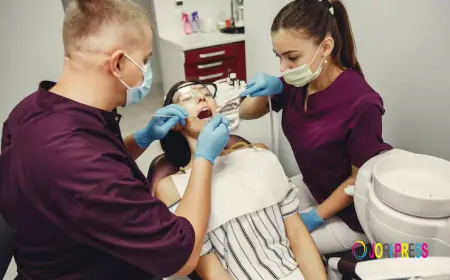How Group Therapy Helps in Mental Health Treatment

Mental health treatment encompasses various therapeutic approaches designed to support individuals in managing emotional, psychological, and behavioral challenges. Among these approaches, group therapy has emerged as a powerful and effective method for fostering healing and personal growth. Unlike one-on-one therapy, group therapy provides a unique environment where individuals can share experiences, gain insights, and develop coping strategies within a supportive community.
This article explores how group therapy contributes to Mental Health Treatment Dubai, its benefits, and why it may be an excellent option for those seeking emotional and psychological support.
Understanding Group Therapy in Mental Health Treatment
Group therapy is a form of psychotherapy where a small, carefully selected group of individuals meets regularly under the guidance of a trained therapist. These sessions focus on addressing common emotional struggles, improving interpersonal skills, and promoting mental well-being.
The Structure of Group Therapy
Group therapy sessions typically involve 5 to 15 participants who meet weekly or bi-weekly. The therapist facilitates discussions, ensuring a safe and structured environment where members can openly express their thoughts and feelings. Sessions may follow a specific theme, such as anxiety management, depression support, or trauma recovery, depending on the group’s focus.
Different Types of Group Therapy
There are several types of group therapy, each catering to different needs within mental health treatment:
Support Groups – These groups provide a space for individuals facing similar challenges to share experiences and offer mutual encouragement. Examples include grief support groups or addiction recovery groups.
Skill Development Groups – These focus on teaching coping mechanisms, such as stress management, communication skills, or emotional regulation techniques.
Process-Oriented Groups – These encourage deeper self-exploration, allowing members to discuss personal issues and receive feedback from peers.
Cognitive-Behavioral Therapy (CBT) Groups – These are structured sessions that help individuals identify and change negative thought patterns contributing to mental health struggles.
The Benefits of Group Therapy in Mental Health Treatment
Group therapy offers numerous advantages that complement traditional individual therapy. Here’s how it enhances mental health treatment:
Provides a Sense of Belonging
Many individuals struggling with mental health issues feel isolated. Group therapy creates a supportive network where members realize they are not alone in their struggles. This shared understanding fosters connection and reduces feelings of loneliness.
Encourages Shared Learning
Hearing others’ experiences and coping strategies can provide new perspectives. Participants often learn from each other, discovering different ways to handle challenges they may not have considered before.
Improves Social Skills
For those with social anxiety or difficulty forming relationships, group therapy offers a safe space to practice communication and interpersonal skills. Regular interaction helps build confidence in social settings.
Offers Emotional Support
The group setting allows members to receive and give encouragement. Knowing that others empathize with their struggles can be incredibly validating and uplifting.
Promotes Accountability
Group members often motivate each other to stay committed to their mental health treatment goals. The shared commitment fosters a sense of responsibility toward personal growth.
Cost-Effective Mental Health Treatment Option
While individual therapy is highly beneficial, group therapy can be a more accessible option for many, providing professional guidance in a shared setting.
Who Can Benefit from Group Therapy?
Group therapy is a versatile mental health treatment suitable for various conditions, including:
-
Depression and anxiety disorders
-
Post-traumatic stress disorder (PTSD)
-
Substance use disorders
-
Eating disorders
-
Grief and loss
-
Chronic illness support
It is also helpful for individuals seeking personal development, such as improving self-esteem or relationship skills.
What to Expect in a Group Therapy Session
For those new to group therapy, knowing what happens during sessions can ease apprehensions.
A Safe and Confidential Environment
Therapists establish strict confidentiality rules to ensure trust and openness. Members are encouraged to share at their own pace without fear of judgment.
Structured Yet Flexible Discussions
While some groups follow a set agenda, others allow open discussions based on members' current concerns. The therapist guides conversations to keep them productive and meaningful.
Active Participation
Members are encouraged (but not forced) to contribute. Listening is just as valuable as speaking, as it helps individuals gain insights from others’ experiences.
Feedback and Reflection
Constructive feedback from peers and the therapist helps individuals see their situations from different angles, fostering personal growth.
Overcoming Common Misconceptions About Group Therapy
Despite its benefits, some people hesitate to try group therapy due to misconceptions.
"Group Therapy Is Less Effective Than Individual Therapy"
Research shows that group therapy can be just as effective as individual therapy for many conditions. The dynamic interaction offers unique advantages that one-on-one sessions may not provide.
"I’ll Be Forced to Share Personal Details"
Participation is always voluntary. Members share only what they feel comfortable discussing, and therapists ensure a respectful environment.

"It’s Only for Severe Mental Health Issues"
Group therapy benefits a wide range of concerns, from everyday stress to more complex mental health conditions. It’s a flexible mental health treatment option for various needs.
How to Get the Most Out of Group Therapy
To maximize the benefits of group therapy, consider these tips:
Be Open-Minded – Approach sessions with willingness to learn from others.
Attend Regularly – Consistency helps build trust and progress within the group.
Practice Active Listening – Paying attention to others’ stories can provide valuable insights.
Give and Receive Feedback Thoughtfully – Honest yet compassionate feedback enhances the therapeutic experience.
Conclusion
Group therapy is a valuable component of Mental Health Treatment in Dubai, offering connection, support, and growth in a collaborative setting. Whether dealing with anxiety, depression, or life transitions, group therapy provides a space to heal while learning from others’ journeys.
For those considering mental health treatment options, group therapy can be a transformative experience, fostering resilience and emotional well-being in a shared, supportive environment. If you or someone you know could benefit from this approach, exploring group therapy may be a positive step toward lasting mental wellness.
What's Your Reaction?
 Like
0
Like
0
 Dislike
0
Dislike
0
 Love
0
Love
0
 Funny
0
Funny
0
 Angry
0
Angry
0
 Sad
0
Sad
0
 Wow
0
Wow
0


















































